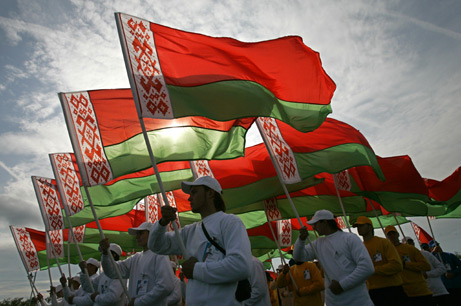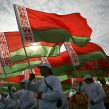
Nation-Building Implications of Russia’s Expansionism
Publication: Eurasia Daily Monitor Volume: 11 Issue: 116
By:

On June 21, Ales Byalyatski, the best-known political prisoner of Belarus, was released. Byalyatski is a political activist known for his work for Viasna Human Rights Centre, of which he is the head. He is also the vice president of the International Federation for Human Rights. On August 4, 2011, Byalyatski was arrested on charges of tax evasion and sentenced to 4.5 years imprisonment as well as the confiscation of his property. Byalyatski’s release was promptly greeted by the United States with satisfaction. In a press statement, the State Department’s spokesperson noted that the US “welcomes the release… of Ales Byalyatski as a positive development.” The statement ends with a message reaffirming US readiness to help the people of Belarus “build a democratic, prosperous, and truly independent European state” (state.gov, June 21).
The last four words of this message fit the spirit of geopolitical confrontation that had directly affected Belarus’s southern neighbor and produced a sort of tentative rapprochement between Belarus and the West—a weaker version of what happened in early 2007, in the wake of a deep trade conflict between Russia and Belarus, and with much greater vigor in the wake of the August 2008 war between Russia and Georgia. During such confrontations, the West openly expresses its concern for the sovereignty of the countries squeezed between Russia and the European Union, while pushing democracy promotion lower down on the agenda.
Meanwhile, the Belarusian side is realizing that, contrary to its verbal commitment to a multi-directional foreign policy, it is essentially flying on one—Russian—wing, to use Alyaksandr Lukashenka’s metaphor that Minsk can only fly if it has both a Russian and a Western wing. Hence the perceived necessity to put the second—Western—wing into action. It is in this context that the release of Byalyatski is seen by non-government political commentators in Belarus. For example, on Tut.by, the most visited, privately owned, Belarusian news site, the June 21 article about Byalyatski is titled “Byalyatski is free: Lukashenka perceived the need for the second wing” (tut.by, June 21)
Aside from the release of Byalyatski, Belarus has also significantly increased its diplomatic activity. During May and the first half of June 2014, Minsk hosted Gunnar Wiegand, the European External Action Service Director, and Jean-Luc Demarti, of the European Commission’s Directorate-General for Trade; bilateral consultations were additionally conducted in Minsk with the foreign ministries of Austria, Poland, Finland and Slovakia (tut.by, June 18). Finally, Vladimir Gerasimovich, in charge of the department of international security and control over weaponry at the Ministry of Foreign Affairs of Belarus, visited Washington (on June 17 and 18) and participated in the first ever Belarusian-US consultations on international security (Belarus Segodnia, June 19).
Two other developments also reflect the effort on the part of Minsk to become more active on the non-Russian directions of its foreign policy. Thus, on June 19, the construction of the Chinese-Belarusian Industrial Park (CBIP) was launched. The park will eventually occupy 8,048 hectares in Smolevichi Rayon of Minsk Oblast. Four companies have already expressed their willingness to become residents of the park, including the Chinese ZTE (telecommunications) and Huawei (information and communication technology). Sixty percent of CBIP’s shares belong to the Chinese government (Salidarnasts, June 19). The second development has been a significant increase in Belarusian potassium (potash) exports. Following the scandalous divorce between Belaruskalii and the Russia-based company Uralkalii, Belarus experienced a decline in potash sales. But according to President Lukashenka, “we have never sold as much potash as we will this year [2014].” Already the former partners from Uralkalii have reportedly asked the Belarusian potash company about the resumption of joint operations (tut.by, June 18).
And while Belarus has been strengthening foreign contacts all across the world, domestically, there has been a visible intensification of debates over the so-called “Belarusian idea”—in other words, about the positive content of Belarusian nationalism. Since the late 1980s, these debates have been all but monopolized by the opposition. But recently, the government has been adding its voice to the debate (see EDM, January 21), apparently indicating that healthy nationalism is indispensable for Belarus’s statehood.
A lengthy June 21 article by historian and Belarusian member of parliament Igor Marzalyuk in Belarus’s major government daily, is fully devoted to the “Belarusian national idea.” Marzalyuk traces this idea to Gomon (Hubbub) magazine, founded in 1884 in St. Petersburg by an ethnic Belarusian (Alexander Marchenko) and a Jew from Belarus (Chaim Ratner). According to Marzalyuk, from the time of Gomon, the Belarusian national movement has always had an anti-Polish thrust. This was because throughout the 18th and 19th centuries, all the high culture created in Belarus was essentially a variety of Polish culture, a result of the Polonization of Belarusian lands that unfolded since the end of the 16th century within Rzeczpospolita (the Commonwealth of Poland and Lithuania). The fight against the legacy of Polonization thus implied a union with Russia’s political elite. Marzalyuk casts modern Belarus as a citadel of traditional European culture and morality, opposed to revolution, forcible transfers of power, same-sex marriages and abortion. Still, he admits that despite the leading role of Orthodoxy in Belarus, all three major Christian denominations—Orthodox, Catholic and Protestant—have their niches in the country (Belarus Segodnia, June 21).
Importantly, Marzalyuk also quotes the Ukrainian thinker Viacheslav Lipinsky who mused about the spatial niche of Ukraine. Ukraine’s special position, Lipinsky argued, allows it take on one of three possible roles: either as the advance guard of the democratic West in the destruction of what he called the Russian East (of Europe), or the advance guard of the ochlocratic (mob-ruled) Russian East in the destruction of the West, or, finally, as a defender of the Russian East from both Western democracy and Asian ochlocracy. According to Marzalyuk, the current policy of the Kyiv government fits the first of the three aforementioned options, but the author does not say clearly which of these options is optimal for Belarus. The parliamentarian does, however, criticize the widespread Russian idea that a split of the original ethnic community of Rus into Russians, Ukrainians and Belarusians was artificial and that Ukrainian and Belarusian statehoods are geopolitical nuisances that have to be eliminated (Belarus Segodnia, June 21).
If, indeed, every action begets a counteraction, then Russia’s expansionism is the major factor of nation-building in Russia’s western neighbors. This is definitely true as far as Ukraine is concerned, and it appears to be increasingly true in seemingly conflict-free Belarus as well.




